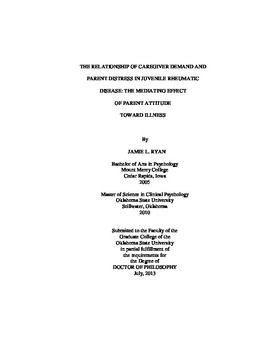| dc.contributor.advisor | Mullins, Larry Lee | |
| dc.contributor.author | Ryan, Jamie Lynn | |
| dc.date.accessioned | 2014-09-24T14:17:06Z | |
| dc.date.available | 2014-09-24T14:17:06Z | |
| dc.date.issued | 2013-07 | |
| dc.identifier.uri | https://hdl.handle.net/11244/11041 | |
| dc.description.abstract | Scope and Method of Study: The current study examined the association between parent illness attitudes, caregiver demand, and parental distress in a sample of parents of youth with Juvenile Rheumatic Diseases (JRDs, n = 69). Specifically, the study examined the potential mediating effect of parent illness attitudes on the caregiver demand to parental distress relation. Participants were recruited from the pediatric rheumatology clinic at a large teaching hospital in the Midwest. Parents completed the Caring for My Child with a Rheumatic Disease Scale, Parent Attitudes Toward Child's Illness Scale, and the Brief Symptom Inventory. The pediatric rheumatologist completed a measure of functional ability. | |
| dc.description.abstract | Findings and Conclusions: Consistent with hypotheses, higher caregiver demand and negative illness attitudes was associated with increased parental distress. Additionally, parent illness attitudes mediated this relation, such caregivers with more negative evaluations of their child's rheumatic disease are at increased risk for adjustment difficulties. Finally, exploratory analyses revealed that caregiver demand and parent illness attitudes were associated with both general and domain-specific indices of parent distress. Specific to illness attitudes, exploratory analyses revealed that parents who feel different compared to other parents of health children or feel limited in participating in activities as a result of their child's illness are more likely to experience increased parental distress, compared to feelings of guilt of sadness. The current study is limited by sample size and inclusion of youth in pre-adolescent and adolescent stages of development. However, results of the current study highlight the importance of addressing and screening for parent adjustment difficulties during their child's medical visits. Furthermore, family systems and parent-focused interventions aimed at altering negative illness attitudes may be beneficial in preventing adjustment difficulties for the entire family. | |
| dc.format | application/pdf | |
| dc.language | en_US | |
| dc.rights | Copyright is held by the author who has granted the Oklahoma State University Library the non-exclusive right to share this material in its institutional repository. Contact Digital Library Services at lib-dls@okstate.edu or 405-744-9161 for the permission policy on the use, reproduction or distribution of this material. | |
| dc.title | Relationship of caregiver demand and parent distress in juvenile rheumatic disease: The mediating effect of parent attitude toward illness | |
| dc.contributor.committeeMember | Chaney, John M. | |
| dc.contributor.committeeMember | Page, Melanie C. | |
| dc.contributor.committeeMember | Winterowd, Carrie | |
| osu.filename | Ryan_okstate_0664D_12197.pdf | |
| osu.accesstype | Open Access | |
| dc.type.genre | Dissertation | |
| dc.type.material | Text | |
| thesis.degree.discipline | Psychology | |
| thesis.degree.grantor | Oklahoma State University | |
